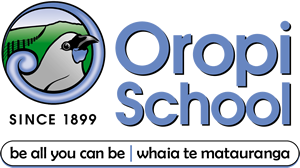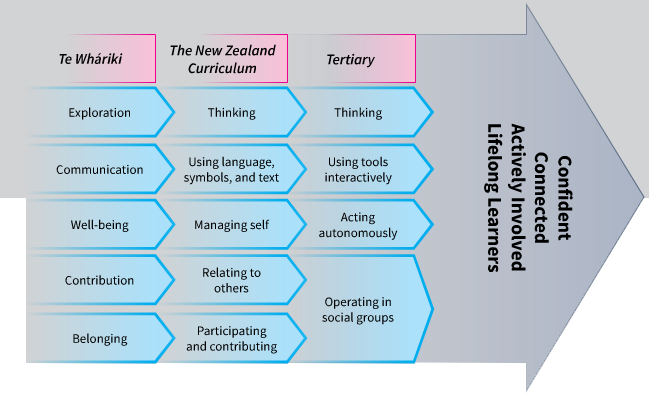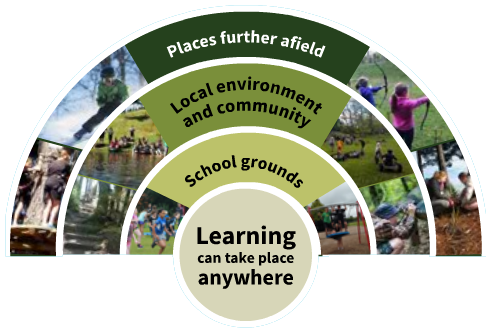TEACHING & LEARNING
at Oropi School

At Oropi School we place the child at the centre of the learning. This is because we identify that every child comes to school with their own natural wonderings, questions, passions, strengths and areas of need.
It is through Play Based Learning and Individualised Inquiry that we provide children the opportunity to explore and extend on these questions and wonderings. The children are given the resources, support and time to experiment and challenge their ideas in safe environments. Teachers facilitate these opportunities with the children closely, providing resources, support and time to extend and challenge their thinking and learning.
Play Based Learning fosters and provides smooth transitions for our new entrant students as they enter learning spaces that are similar to those they have known in Early Childhood settings. Our learning environments help us incorporate the Dispositions to Learning that are a pillar to the Early Childhood Curriculum. This curriculum has relevance in the Primary School setting right through to Year 3 and is intended to cater for children up to this age.
As identified in this diagram, these Dispositions of Learning fit hand in hand with the Key Competencies of the New Zealand Curriculum for school aged children. These dispositions and key competencies are crucial life-long competencies that will ensure the future success for our students.
It is now through play based learning and individualised inquiry that the students can access all of the available curriculum areas along with a large number of key learning areas such as ICT.
This approach to learning ensures we have passionate, open-minded and resilient students who have a genuine love for exploring, creating, learning and experimenting. At Oropi School they are being enabled to become confident life-long learners as they can question the world around them while developing the confidence and skills needed to find the answers they seek.
Oropi Staff
For further information and specific examples, hover over the diagram.
오로피 초등학교에선 주입식이 아닌 학생들 스스로가 학업의 중심이 설 수 있게 노력하고 있습니다. 학생들은 고유의 자연적인 호기심들, 질문들, 열정, 강점들 그리고 필요의 영역들을 갖고 학교에 오기 때문이죠.
오로피 스쿨의 학생들은 놀이 중심의 학습을 통해서 각자 질문의 해답을 찾아가는 과정과 생각들을 더 넓힐 수 있는 기회를 만들어 주고 있습니다. 학생들은 안전한 환경에서 자신들의 실험과 도전할 수 있도록 적절한 시간, 자원, 도움을 받고 있습니다. 선생님들은 학생들이 자신들의 도전과 실험에서 어떤 것들이 필요한지 세심히 신경써주시고 그 생각과 도전들이 더 발전할 수 있게끔 도와주고 계십니다.
학습 욕구는 유아 교육에서 중요한 요소 입니다. 오로피 초등학교의 놀이바탕의 교육법은 학교라는 갑작스러운 변화보다 부드러운 변화를 추구하고 있습니다. 이러한 변화는 이미 우리 학생들이 유아교육에서 체험했던 방식입니다. 이 교육 방식은 학습이 어렵지 않게 초등학교 3학년 단계까지 이끌어 주는 것을 목표로 하고 있습니다.
오로피 초등학교에서 제공하는 교육방식은 장기적인 관점에서 우리 학생들을 더욱 더 학습에 자신감있고 적극적인 학생이 될 수 있도록 노력하고 있습니다.
어린 학생들의 학습은 놀이와 호기심으로부터 시작되어 ICT 같은 주요한 학습영역을 포함한 가능한 모든 학습 영역에서 정답을 찾는 과정을 거치게 됩니다.
이러한 방식은 우리 학생들이 열정을 갖고 열린 사고를 하며 어떤 문제들에 탄력있게 대처할 수 있게 하며 탐험, 창조, 학습과 실험에 진짜 열정을 갖게 합니다. 그들이 구하고자 하는 답들을 찾기 위해서 필요한 자신감과 기술들을 개발하면서 세상에서 궁금한 것들에 질문할 수 있게 될 것을 기대하기에 오로피 학교에서 학생들은 삶속에서 끊임없이 배워갈 수 있을 것입니다.
Oropi学校始终将学生放在教学的中心。我们相信:每个孩子都是带 着与生俱来的好奇、求知、热情、优势和学习需要来到学校的。
通过“基于游戏的学习理论”和“个性化探究理论”,我们为学生提供了 探索未知世界的机会。在安全的环境中,学生会有足够的资源和时间 去尝试和探索他们的奇思妙想。老师们将通过近距离观察、提供资 源、帮助和支持来激发学生的思考和学习,增加他们学习的机会。
“基于游戏的学习理论”为学生们提供了顺利的转换空间。当新生入 学,他们将实现顺利过渡,因为这与他们童年时期的生活经历相似。 此外,我们的学习环境将为我们培养学生孩童时期的学习性格提供极 大帮助。该课程设置与小学课程大纲相关联,又能满足3年级以上学 生的需要。
如图显示,这些学习性格与新西兰学龄儿童的关键能力发展相互包 容。这些性格和关键能力发展对孩子们养成受用一生的能力有至关重 要的作用,也保证了孩子们未来的成功。
如今,通过“基于游戏的学习理论”和“个性化探究理论”,我们的学生 通过大量至关重要的学习媒介领域(如信息通信技术),能够接触所 有可用的学习课程。
这种学习方法能够保证我们的孩子真正爱上探索、创造、学习和尝 试,成长为充满热情、思维活跃、适应力强的学生。在Oropi 学校, 他们能够成为最自信的终生学习者,因为他们在向这个奇妙的世界提 出问题的同时,也培养了自己的自信和解决问题的能力!
Oropi学校职员
The Child
At the Centre of our Teaching and Learning Philosophy sits the child.
Every child brings a variety of influences and key considerations that must be considered in order for the child to have true success with their learning. These considerations must drive the learning path.
- Passions/ Interests
- Culture
- Whanau / Family
- Strengths and weaknesses
Play Based Discovery
It is through play that children learn, process and practice behaviours and skills they have observed, learnt or been taught.
While playing, children are immersed in essential lifelong skills such as collaboration, cooperation, communication and negotiation.
It is through play that the children access the New Zealand Curriculum’s Key Competencies and the Te Whariki (Early childhood curriculum) Dispositions of Learning.
“Play is the highest form of research’
- Albert Einstein
Belonging - Participating and Contributing
Contributing - Relating to Others
People use these competencies & dispositions to live, learn, work and contribute as active members of their communities. More complex than skills, these competencies also draw knowledge, attitudes and values in ways that lead to action.
These competencies & dispositions are not separate or stand-alone. They are the key to learning in every learning area.

Opportunities to communicate
It is crucial that student get the opportunity to communicate and act on their learning. This is one of the key differences between traditional teaching and inquiry / play based learning.
Children need to see that there is a purpose and context in all the learning we do. By acting on their newly learn knowledge and by applying it to real world contexts, children see purpose in what they do.
If a child can clearly articulate the learning process they have just taken part in, they reflect a true grasp of what they have just learnt.
At Oropi School we have an open door policy where parents, caregivers and whanau can come and view their children’s learning.
Examples of communicating and acting on learning of communicating and acting on learning
- Market Days
- Learning Stories
- Child-led assemblies
- Go kart Racing
- The Kokako Garden ETC
Play Based Discovery
& Individualised Inquiry
The Key Competencies
Dispositions of learning
- Literacy
- Numeracy
- ICT Integration
- Language & Inter-
cultural Learning - Environmental &
Social Contexts & Eotc
The Arts- Physical
Education/Health - Science &
Technology
Opportunities to communicate
And act on learning
Literacy
Literacy in English gives students access to the understanding, knowledge, and skills they need to participate fully in the social, cultural, political, and economic life of New Zealand and the wider world. To be successful participants, students need to be effective oral, written, and visual communicators who are able to think critically and in depth.
- National Library
- Journal Surf
- Book Week
- School Library
- In class Literacy learning support
- Out of class Literacy support
- Rainbow Reading
- Lexiacore 5
- Local Library visits
- School responsibilities in literacy
Numeracy
By studying mathematics and statistics, students develop the ability to think creatively, critically, strategically, and logically. They learn to structure and to organise, to carry out procedures flexibly and accurately, to process and communicate information, and to enjoy intellectual challenge.
By learning mathematics and statistics, students develop other important thinking skills. They learn to create models and predict outcomes, to conjecture, to justify and verify, and to seek patterns and generalisations. They learn to estimate with reasonableness, calculate with precision, and understand when results are precise and when they must be interpreted with uncertainty. Mathematics and statistics have a broad range of practical applications in everyday life, in other learning areas, and in workplaces.
- Alim
- Otago Problem Solving
- Activity based Numeracy programmes
- In class Numeracy learning support
- Out of class Numeracy support
- Problem Solving - Practical problems
- Year 7/8 problem solving challenges
- Meaningful contexts
ICT Integration
In an ever-changing world, it is important that education moves with the times. The use of ICT is more prevalent than ever and its uses are expanding continually. ICT is enhancing and altering human activity, enabling us to live, work and think in new ways. Students must be prepared to understand, use and apply ICT in effective, efficient and ethical ways.
It is our job, as educators, to ensure children feel confident and safe using technology. We use ICT to take learning beyond the classroom, connect them with the world and prepare children for global citizenship. ICT inspires children to further their learning and enables them to expand their knowledge and skills. It provided children with increased opportunities to discover and explore new learning.
EXAMPLES
- Entering MADE awards
- Movie Making
- Digital presentations to show parents and community
- Digital image creations
- Class Bloggs
- CODE Y3 up
Language & Inter-cultural Learning
Our languages program is a culmination of leading pedagogy and home-grown contexts.
Culturally our children experience a wide range of Maori and Mandarin customs, protocols, arts, traditions, festivities and perspectives. This is a rich tapestry of life experiences for any child to be learning.
Our students have opportunities to use their language skills in meaningful context and develop their cultural world view by engaging in critical and diverse experiences.
EXAMPLES
- lnterschool Exchange
- Kapahaka
- China trips
- Mandarin Club
- Weekly Language and cultural lessons
- lnterschool Chinese speech competitions
- Ra Whakangahau
Here at Oropi we offer language and cultural opportunities in Maori, Mandarin and Spanish. Our language program has been organically developed based on leading pedagogy in second language acquisition.
Whilst the linguistic development is crucial for competence and fluency in a language we also recognize the inherent link with cultural understanding and experiences. Culturally our children experience a wide range of Maori, Spanish and Mandarin customs, protocols, arts traditions, festivities and perspectives. This is a rich tapestry of life experiences for any child to be leaving primary school with.
Environmental &
Social Contexts & Eotc
EOTC programmes provide students with access to hands-on experiences that are not available inside the classroom. They offer unique and stimulating learning opportunities that support your child’s learning and achievement.
EOTC is a generic term used to describe curriculum based learning and teaching that extends the four walls of the classroom. EOTC can range from a museum or marae visit to a sports trip, an outdoor education camp, a field trip to the rocky shore, or a visit to practise another language. EOTC can take place in the school grounds, in the local community, or in regions further afield, including overseas.
The links that students are able to make between the classroom and real-world experiences can be critical to their long-term learning.
EXAMPLES
|
|

The Arts
Arts education explores, challenges, affirms, and celebrates unique artistic expressions of self, community, and culture. It embraces toi Maori, valuing the forms and practices of customary and contemporary Maori performing, musical, and visual arts.
In the arts, students learn to work both independently and collaboratively to construct meanings, produce works, and respond to and value others’ contributions. They learn to use imagination to engage with unexpected outcomes and to explore multiple solutions.
EXAMPLES
- School Ball
- School Choir
- Dance Day
- Music Tutition (individual, group and small group - vocal, keyboard, guitar]
- Arts
- Opportunities through discovery learning
Physical
Education/Health
At Oropi School, in order for children to learn the best, we acknowledge the importance of meeting all of the needs children. These needs are academic (IQ), physical, social and emotional (EQ).
Through learning and by accepting challenges in health-related and movement contexts, students reflect on the nature of well-being and how to promote it. As they develop resilience and a sense of personal and social responsibility, they are increasingly able to take responsibility for themselves and contribute to the well-being of those around them, of their communities, of their environments {including natural environments}, and of the wider society.
This learning area makes a significant contribution to the well-being of students beyond the classroom, particularly when it is supported by school policies and procedures and by the actions of all people in the school community.
EXAMPLES
- Sports teams
- GO4iT skills curriculum
- Surf Safety
- Water safety programme and swimming lessons with Tauranga Swim School
- Gymnastics
- Tennis
Science & Technology
SCIENCE: Science is able to inform problem solving and decision making in many areas of life. Many of the major challenges and opportunities that confront our world need to be approached from a scientific perspective, taking into account social and ethical considerations. By studying science, students: develop an understanding of the world, built on current scientific theories learn that science involves particular processes and ways of developing and organising knowledge and that these continue to evolve use their current scientific knowledge and skills for problem solving and developing further knowledge use scientific knowledge and skills to make informed decisions about the communication, application, and implications of science as these relate to their own lives and cultures and to the sustainability of the environment.
TECHNOLOGY: The aim is for students to develop a broad technological literacy that will equip them to participate in society as informed citizens and give them access to technology-related careers. They learn practical skills as they develop models, products, and systems. They also learn about technology as a field of human activity, experiencing and for exploring historical and contemporary examples of technology from a variety of contexts.